A classic question that never seems to die (especially among new developers)... what is the best JavaScript framework - Angular, React, or Vue?
There are two main reasons people ask this question:
- You want to decide which framework to use for a specific project, or
- You want to decide which one is worth learning (i.e: what’s best for your career)
In the end, each of these 3 frameworks serves basically the same purpose. They allow you to build rich front-end applications.
Angular is the entire kitchen that gives you all the tools necessary for you to build the meal that is your web app. If I am a bank with lots of developers, I like Angular to keep everyone working in the same pattern.
React is the oven. You’ll most likely need more tools to bake that cake, but it allows you the flexibility to pick and choose what tools you want based on your needs. If I’m a tech company with strong senior developers who can make good decisions, I like React.js.
Vue is the microwave that allows you to get up and running really fast and make your cooking life efficient and easy. If I am a startup with a young developer team and a strict deadline, I like Vue.js.
Yes, this is a simple example and there are many more things to consider when choosing a framework for your project.
But in general, one isn’t significantly better than the other and there’s no one tool that can do everything the best. Each has their own strengths and weaknesses.
So then how do you decide which one to use or learn?
Well, hopefully, this guide helps. I’ll give you all the information you should need so you can decide for yourself which framework is best for you depending on your situation.
Before I do that though… we need to ask ourselves:
Is this even the right question to ask?
If you want to be a great programmer, you need to change your mindset and stop thinking this way and stop asking questions like “which framework is best”.
Great programmers think in terms of pros and cons based on their needs:
- When should you pick one tool over the other?
- Why was this tool built? What problem was it trying to solve?
- Why would it be good in some situations and not in others?
- What end goal am I trying to achieve and what tool is best to achieve that goal?
These are the questions you should ask.
Being dogmatic and declaring one library or framework to rule them all is something only said by people who don’t know their history, can't be bothered to learn a new tool, or have some other vested interest.
For example:
jQuery, Backbone, and AngularJS (now just Angular), were all useful when they came out.
They provided 10x benefit to what there was before, but eventually, they all evolve and move on as the community grows, web platforms change, and user preferences shift.
What’s best today might not be best this time next year.
What you should care about more than React, Angular, or Vue
Great programmers are the ones who don’t just know how to use one of these tools.
More importantly, they see the high-level reason for why these tools exist and can make decisions on when to use one over the other by spending time learning what problems each tool solves.
They aren’t dogmatic about the tools they use. They pick the best tool for the job at hand.
They make sure they know the fundamentals and the tried and tested computer science topics that underlie everything like data structures & algorithms, how compilers work, how design patterns can help build large systems, etc.
They are ready for the next wave by having a long-term mindset.
The more years of experience you have, the more you start to realize that in order to keep up with the industry, you don’t need to memorize every single API, learn every hot new tool or framework that comes out, listen to every single podcast, watch every single conference talk, or read every single blog post.
You need to learn and understand the fundamental principles that underlie all these tools.
But that doesn’t mean you should ignore these tools. Being on the other end of the spectrum saying that all these libraries and tools are useless is just as bad.
If you have a drill available to you, why waste time and effort using a screwdriver?
Further recommended reading:
- How to become a Software Engineer
- 4 Habits of Great Software Engineers
- The 10 Hard Truths About Being A Software Engineer
- Don’t be a Junior Developer
- How To Become A 10x Developer
So why learn any of these then?
As developers, we’re constantly seeking tools that can help us to build better applications and become more efficient. If there are tools that can help us do that, why not use them!
The same logic applies to all the AI hype happening these days. They’re simply tools. They don’t replace understanding the fundamentals and being able to ask the right questions and think creatively to solve problems.
Angular, React, and Vue all have major selling points to use and learn them:
-
High Demand in the Market: Startups, established companies, and tech giants all hunger for developers skilled in these technologies. By mastering any of these frameworks (and libraries), you become more marketable and open doors to more opportunities
-
Community Support: Each framework boasts an active community. Angular enjoys Google’s backing, React thrives under Facebook’s umbrella, and Vue - though not backed by a tech giant - has a passionate community rallying behind it
-
Learning Experience: Angular, React, and Vue all expose you to advanced JavaScript concepts. Whether it’s component-based architecture, reactive programming, or state management, you’ll grow as a developer from learning any of them
-
Rich Ecosystem: Beyond the core framework, each ecosystem also offers a treasure trove of complementary tools, libraries, and resources. These extras help to simplify complex tasks and enhance productivity
-
Career Growth: Armed with the right skills, you can level up your career. Whether you’re eyeing a new job, consulting gigs, or even launching your own venture, these frameworks can each play a pivotal role
Alright, now that we’re on the same page, let’s dive deep into each of these frameworks and compare their advantages, disadvantages, current job demand, developer usage, and developer satisfaction!
By the end, you’ll be able to make your own informed decision about which framework to use or learn.
Because I still get so many questions, I’ll give you a few of my own opinions along the way but you should also seek out the opinions of many experts, not any one person
Let’s do it!
Mile-High Comparison Chart
If you’re in a rush or prefer a quick overview, here’s a high-level comparison between Angular, React, and Vue:
| Category | Angular | React | Vue |
|---|---|---|---|
| Type | Framework | Library | Framework |
| Language | TypeScript | JavaScript / JSX | JavaScript / JSX / TypeScript |
| Learning Curve | Steep | Moderate | Easy |
| Popularity (Stars) | 96,965 ⭐ | 232,319 ⭐ | 48,794 ⭐ |
| Popularity (Issues) | 1,746 | 957 | 983 |
| Developer Opinion (% that want to keep using it) | 53.4% Admired | 33.4% Admired | 60.2% Admired |
| Developer Demand (% that want to learn it) | 13.9% Desired | 62.2% Desired | 16.3% Desired |
| Current Job Demand (US Market) | 23,070 Jobs | 52,103 Jobs | 2,031 Jobs |
You’ll notice that I’ve also looked into the current usage data (are people using it?), job demand (how many companies are hiring for it?), and developer satisfaction (do people enjoy using it?).
I’ll share more on these later, as these are the most important factors if you’re choosing a new skill to learn.
However, if you’re looking to learn more about these because you have a specific project in mind, here are some brief technical stats.
Type
Angular is a full-fledged MVC framework. React is a library focused on building UI components. Vue is considered a progressive framework, designed for easy adoption.
Language
Angular uses TypeScript which is a statically typed superset of JavaScript. Both React and Vue use JavaScript with the option to use JSX and also support TypeScript
Learning Curve
- Angular - Has the steepest learning curve due to its opinionated structure and TypeScript. However, Angular 17’s signals simplify state management, reducing complexity for new learners
- React - JSX can still be an adjustment for beginners, but React 18’s automatic batching improves reactivity without extra learning overhead
- Vue - Previously the easiest to learn, Vue 3’s Composition API is now the best practice, making it more modular but requiring a shift from the old Options API
Popularity
- React remains by far the most popular, maintaining its #1 spot. However, React’s GitHub stars grew by ~5,000 (from 227,000 to 232,319), a smaller increase compared to previous years
- Angular saw a decline in new stars, growing by only ~900 stars (from 96,000 to 96,965)
- Vue, which had previously experienced 27% growth in daily downloads, has stabilized, reaching 48,794 stars, showing steady but slower adoption
Performance
All three options offer high performance, but React and Vue have an edge because of their virtual DOM feature.
- Angular 17 has improved its performance significantly by introducing signals, reducing unnecessary component re-renders and making change detection more efficient
- React’s concurrent rendering in React 18 allows it to update components more smoothly without blocking the UI
- Vue remains highly optimized, but Vue 3’s reactivity system provides better fine-grained updates, improving rendering efficiency in larger applications
Scalability
- Angular - Best suited for large-scale applications due to its robust architecture and TypeScript enforcement. Angular 17 introduces signals for reactivity, making state management more predictable and improving performance
- React - Scales well due to a rich ecosystem, with React 18’s concurrent rendering reducing UI bottlenecks
- Vue - Previously seen as better for small-to-medium projects, Vue 3’s Composition API allows for better modularity and scalability, making it more viable for large applications.
Community Support
Angular continues to be backed by Google, React is supported by Meta (formerly Facebook), and Vue has a passionate open-source community that keeps growing.
Job Market Demand
- React still dominates, but the number of job postings dropped from ~80,000 in 2024 to 52,103 in 2025, signaling some market shifts
- Angular also saw a drop, from ~37,000 jobs in 2024 to 23,070 in 2025
- Vue remains the least in-demand in the US, with just 2,031 open jobs, down from 13,074 last year, a significant decline
Important: Remember of course that this is a high-level overview, and there's more to picking one of these tools than a simple chart and notes. The best choice will always depend on your project requirements, personal preferences, and existing knowledge.
With the initial overview out of the way, let’s dive deeper into each framework to understand their individual strengths and weaknesses.
Deep Dive: Angular
What is Angular?
Angular, originally introduced by Google in 2010 as AngularJS, is a powerful, full-featured JavaScript framework. In 2016, it underwent a complete rewrite and was relaunched as Angular.
Why was Angular created?
Angular was built to simplify and structure the process of building complex, large-scale web applications and single-page applications (SPAs).
It achieves this through its opinionated design, providing developers with strong guidelines on how applications should be structured and how components should interact. This involves adhering to a specific structure and coding pattern.
Angular primarily uses TypeScript, which is a statically typed superset of JavaScript.
TypeScript adds robust type-checking and features like decorators and interfaces to the language. This adherence to structure makes Angular code more predictable and easier to debug, especially in larger projects
Angular also aimed to solve the challenge of creating single-page applications - dynamic applications that can update and render portions of their content without requiring a full page reload from the server.
Pros of Angular
-
Comprehensive Solution: Angular is a complete package. It includes everything you need to build a complex web application, reducing the need for additional libraries
-
Component-Based Architecture: Angular’s component-based architecture promotes reusability, modularity, and easy management of components. For example, you can create reusable UI elements like navigation bars, buttons, and forms as Angular components
-
Dependency Injection: Angular follows a dependency injection design pattern, allowing for greater efficiency and modularity in your applications. By injecting services into components, you can manage shared data, authentication, and other cross-cutting concerns effectively
-
TypeScript: TypeScript usage in Angular leads to better type-checking and improved editor tooling, resulting in more robust software and productive developers. The static type system catches errors early, preventing runtime surprises
-
Mature & Robust Ecosystem: Angular has been around for a while, which means it has a mature ecosystem with abundant resources available. You’ll find extensive documentation, tutorials, and community-contributed packages
Cons of Angular
-
Steep Learning Curve: Angular’s comprehensive feature set, coupled with TypeScript can make it challenging to pick up for beginners. Learning Angular requires time and effort. However, once you grasp the concepts, you’ll appreciate the structure it provides
-
Verbose and Complex Syntax: Compared to Vue and React, Angular’s syntax can be more verbose and complex. The use of decorators, lifecycle hooks, and template syntax may feel overwhelming initially
-
Performance Issues: For extremely large datasets and complex applications, Angular might exhibit performance issues. Proper optimization, lazy loading, and smart component design are essential to mitigate this. That being said, if you’re following strict structure practices then you should be doing this anyway
TL;DR
Angular offers a comprehensive solution for complex web applications, thanks to its component-based architecture, strong dependency injection, TypeScript support, and a mature ecosystem. It’s a complete package that reduces the need for additional libraries.
However, Angular does have a steep learning curve due to its feature-rich nature and verbose syntax. Not only that, but performance issues may arise in large datasets, emphasizing the need for optimization strategies.
Understanding these pros and cons will help you make an informed decision about whether Angular is the right choice for your project.
Don’t make your choice just yet though. Let's first dive into similar details for React and Vue.
Deep Dive: React
What is React?
React is a JavaScript library developed and maintained by Facebook.
Important: React is not a full-featured framework like Angular – it's a library focused on the view part of your application.
This means that while you can use React to build the UI components of your application, you have the freedom to choose other libraries for other parts of your application like state management, routing, etc.
Why was this tool built?
React was created by Facebook in 2013 with the goal of simplifying the creation of interactive user interfaces. Not only that, but Facebook was finding issues with code maintainability as their applications grew increasingly complex.
Basically, they were looking for a way to break down complex UI into reusable pieces that could be managed independently, and that’s what they achieved with React.
The idea behind it was to have a tool that can build large applications with data that changes over time, and do it fast. To make this possible, React introduced the concept of the "Virtual DOM," which is a lightweight copy of the actual DOM.
This then allowed React to determine which parts of the actual DOM need to change without having to render the entire DOM tree, significantly boosting an application's performance.
Pros and Cons of React
As with any technology, React has its strengths and weaknesses.
Pros
-
Fast Learning Curve: React is much easier to learn compared to Angular, thanks to its focus on simplicity and its usage of JavaScript
-
Great Performance: React improves performance through the virtual DOM. Direct changes in the DOM are costly, but with a virtual DOM, React can calculate the minimal number of operations needed to keep the real DOM up-to-date
-
Flexibility: Unlike Angular, React provides more freedom and flexibility. You can choose the other technologies you want to add to your project, and are not limited
-
Community Support: React has a very active community and a rich ecosystem of libraries and tools
-
Backed by Facebook: React is used in production by Facebook, Instagram, and WhatsApp, demonstrating its reliability and efficiency
Cons
-
Only the View Layer: React only provides the view layer, so you need to choose and integrate with other libraries to have a complete tooling set
-
Too Much Flexibility: The flexibility that React provides can be overwhelming, especially for new developers. There are often a lot of ways to do the same thing, and it can be unclear which way is best
-
Fast-paced Ecosystem: While a rich and vibrant ecosystem is a pro, it also means that the libraries and tools in React's ecosystem change and evolve quickly, and keeping up with the latest tools can be challenging
TL;DR
React simplifies UI development, offers great performance through the virtual DOM, and enjoys strong community support. However, its flexibility can be overwhelming, and staying current with the fast-paced ecosystem requires effort.
Deep Dive: Vue
What is Vue?
Vue.js, simply known as Vue, is an open-source JavaScript framework for building user interfaces and single-page applications.
Why was Vue created?
Introduced in 2014 by Evan You, a former Google engineer, Vue is known for its ease of integration with existing projects thanks to its incrementally adoptable design. In fact, it's often dubbed a ‘progressive’ framework for this very reason.
The core principle guiding Vue's design was incremental adoptability - the ability to scale from managing small, static websites to powering large, complex single-page applications as and when the need arose.
The idea was to provide an intuitive, versatile tool that developers could effortlessly incorporate into their workflow, and simplify the work done with other frameworks like AngularJS.
Here’s how it works:
Vue works by focusing on the concept of components, promoting modularity and reusability in code.
This means that Vue can provide developers with a flexible approach to coding, with options to use JavaScript, TypeScript, or a JSX-like syntax. Also, similar to Angular, it uses a template syntax, allowing HTML and JavaScript to coexist in the same file.
While the core library concentrates on the view layer, integrating other libraries for added functionality is straightforward as the complexity of a project increases.
For example
For projects that require more advanced features, leveraging a Vue.js admin framework can simplify the integration of additional libraries and functionalities as the complexity of a project increases
Pros and Cons of Vue
As with any technology, Vue has its strengths and weaknesses.
Pros
-
Ease of Use: Vue is known for its simple and clean design. Most developers find Vue's API to be straightforward and intuitive
-
Flexible and Modular: Vue's component-based approach allows for great flexibility and modularity in coding
-
Performance: Vue's smaller size can lead to faster load times and improved performance in comparison to heavier frameworks
-
Detailed Documentation: Vue's documentation is very detailed and easily accessible, making it beginner-friendly
-
Community and Ecosystem: Although Vue is not backed by a tech giant like Angular or React, it boasts a vibrant and active community and its ecosystem is continually growing. This is actually a big deal, as smaller tools tend to have a much smaller ecosystem, but Vue is still growing
Cons
-
Language Barrier: A significant amount of resources and discussions are in Mandarin, as Vue has a large Chinese community. This can be a barrier for developers who aren't fluent in that language. More on this in a second
-
Less Job Market Demand: Currently, Vue has less demand in the US job market when compared with Angular and React
-
Over-flexibility: Vue's flexibility can sometimes lead to inconsistencies in code, particularly in larger teams.
TL;DR
Vue simplifies UI development, offers flexibility, and performs well. However, be aware of the potential language barrier, job market demand, and the need to manage flexibility effectively.
Why is there a potential language barrier?
Simply due to the adoption of the tool. Vue is used all over the world but it also happens to be the tool of choice for some giant Chinese companies such as Alibaba, Baidu, Tencent, Xiaomi and DJI, as an alternative to React or Angular. Hence why the ecosystem has a lot of interactions in Mandarin.
With this in mind, job demand is really going to differ based on where you are in the world. Currently, the job opportunities for Vue in the US are quite small, but Asia might be quite different.
Developer Usage Comparison
I briefly hinted at some of these data points earlier, but let’s look into this a little more, and see what developer usage looks like across React, Angular, and Vue.
Why?
Because we want to know if people are actually using these tools, or if we’re just hearing a lot of hype.
Here is the total number of downloads by developers for each of these tools from NPM (as of Feb 2025):


Here are the Github stars visualized and compared to each other (as of Feb 2025):

And finally, here are the Google trends based on search terms (as of Feb 2025 - this could technically be related to job demand as well):

What we see in the data
It's clear that all three frameworks remain widely used, but the trends over the past year reveal some key shifts:
- React continues to dominate, with the highest number of daily downloads and GitHub stars. However, its year-over-year growth has slowed slightly compared to previous years. Despite this, React remains the top choice for most developers
- Angular has seen a moderate increase in downloads and search traffic, showing steady growth, but its job market demand has dropped slightly. This suggests that while Angular is still widely used, it may not be the first choice for new projects
- Vue’s growth appears to be stagnating in some areas, particularly in search trends, but it continues to see steady adoption in developer usage. However, the drop in job demand suggests that while Vue remains popular for personal and open-source projects, it has yet to gain the same level of enterprise traction as React or Angular
Overall, React remains the most widely used framework, Angular continues to hold a strong presence in larger organizations, and Vue maintains a niche but dedicated following.
My 2 cents:
React continues to dominate in developer activity, followed by Angular, with Vue in third place.
However, while React still has the largest job market and the most resources available, its admiration among developers has dropped, suggesting some fatigue or desire for alternatives.
Why does popularity matter when choosing a framework?
Because a framework’s popularity directly affects how easy it is to work with, including:
- Documentation & Learning Resources – More users mean more tutorials, blog posts, Stack Overflow answers, and online courses
- Community Support – A larger community means you’re more likely to find help when stuck
- Job Opportunities – A higher adoption rate in companies means more career opportunities
- Third-Party Libraries – A popular ecosystem attracts more plugin and library development, making it easier to extend functionality
If you’re choosing based on ease of learning and available support, React is still the best option due to its widespread adoption and extensive community resources.
That being said, Vue has grown in admiration, and Angular remains a solid choice for large-scale enterprise applications, particularly for developers who prefer structured architecture and TypeScript.
Job Demand Comparison
So now that we know which tools are being used the most, let’s look at the job market also, before we make any decisions.
Why do this?
It would suck to learn a popular framework only to find out that there aren’t many job opportunities for it. While developer downloads and GitHub stars show interest, job demand is what truly matters if your goal is career growth.
So let’s have a look at the numbers:

How I got this data:
All jobs were based on open US positions only, so we can get a rough idea of the US job market.
Then I looked at multiple sources and combined the open positions for each.
- LinkedIn is one of, if not the biggest job board. This is a worldwide search for developer job postings for each library
- ZipRecruiter, SimplyHired and Dice are 3 big tech job boards in the USA so the search is geographically targeted there. You may not live in the US, but it’s good to see what is happening in a very important location for tech
What we see in the data:
- React still leads with 52,103 open positions, but this is a decline from last year's 80,615 listings
- Angular job postings have dropped from 37,849 to 23,070, which signals a potential decline in enterprise adoption
- Vue has significantly fewer job openings, dropping from 13,074 to 2,031, making it the least in-demand option in the US
Again though, this is for US based job postings only, so take that into consideration. (Vue is HUGE in other countries).
My 2 cents:
Learn React or Angular if you are looking to have the most options for employment. (At least in the US anyway).
However, let’s look at the final comparison before we lock in our choice.
Developer Opinion Comparison
Although money is important, it's not everything, and ideally, you want to be working with tools that you enjoy right?
With this in mind, let's take a look at StackOverFlow's latest survey to see what devs are saying about each library.
It’s a little confusing at first glance, so here's how it works:
- Desired - The blue dot represents the percentage of people surveyed who want to work with the tool but haven’t yet
- Admired - The red dot represents how many people are currently using it, and also want to keep using it. This helps us understand if they like using the tool
- Finally, the length of the bar between these 2 dots helps to get an idea of the current user awareness or demand for a tool

What we see in the data:
As you can see, devs love React with 62.2% of those who currently use it, wanting to continue to work with it.
Interestingly, Vue is right up there next to it at 53.4%, and Angular is not far behind at 50.75%.
My 2 cents:
If you want to be happy and have the best experience when you are developing, React or Vue are your best choices.
So which should you learn… React, Angular, or Vue?
It’s always important to draw your own conclusions and make sure you’re taking into account your own goals and the strengths and limitations of each tool.
However, just because you asked nicely, my personal recommendation is that React is still the best framework that I would choose to learn between the three.
If we look at the criteria we’ve covered so far:
- React remains the most in-demand framework with 52,103 job listings, nearly double Angular (23,070) and 25x more than Vue (2,031)
- React’s popularity keeps growing—it now has 232,319 stars on GitHub, far ahead of Angular (96,965) and Vue (48,794)
- React has the most admired developer base—62.2% of its users want to keep using it
- React is moderately easy to learn. Not as beginner-friendly as Vue but far easier than Angular
- React gives you flexibility — you can mix and match additional libraries to suit your project needs.
React does the best job of hitting all of these factors.
So if you have limited time and you shouted “TELL ME! JUST TELL ME ONE TO STUDY AND LEARN” and you yell really loud, I would tell you to learn React.
However, this doesn’t mean you should forget about Angular or Vue. They are both still great frameworks.
Everybody has their own opinion and each tool exists to solve a problem. There is no winner-take-all in the tech space (at least not until AI bots by BostonDynamics take over our world).
All three frameworks have continued evolving. React 18’s concurrent rendering enhances UI performance, Angular 17’s signals improve state management and reduce re-renders, and Vue 3’s Composition API is now the standard, making it more modular but slightly altering its learning curve.
If you want the most job opportunities and the widest adoption, React is still the best choice. However, Angular remains a strong option for enterprise applications, and Vue offers an intuitive yet powerful approach for developers who prefer simplicity.
So use the data I've provided combined with your own goals (and maybe some further research) to make an informed decision based on your needs.
If you're interested in learning any of them, then come join Zero To Mastery where we teach all 3 of these frameworks!
And the really cool thing about this? As a ZTM Academy member, you have access to every course in our collection. So you can change your mind anytime or if you want to be a crazy programmer polyglot, you can learn all three!
Each of these bootcamp courses is constantly being updated and improved so you’re always learning the most up-to-date information. Also, each of these frameworks has its own dedicated channels inside of our Private Discord community.
You can ask questions from each of the instructors, other students, and even other alumni who are working as full-time developers!
P.S. Want a sample of our Vue and React courses?
Still on the fence? Check out these free crash courses.
Each of them provides you with the first ~6 hours of our full Bootcamp courses so you can learn the basics with no strings attached.
If you love them and want to keep going deeper, then come join ZTM to take the full boot camp.
Here's the free React crash course video:
Here's the free Angular crash course video:
And here's the free Vue crash course video:
All that’s left now is for you to decide on which framework (or library) that you want to use. Happy coding!
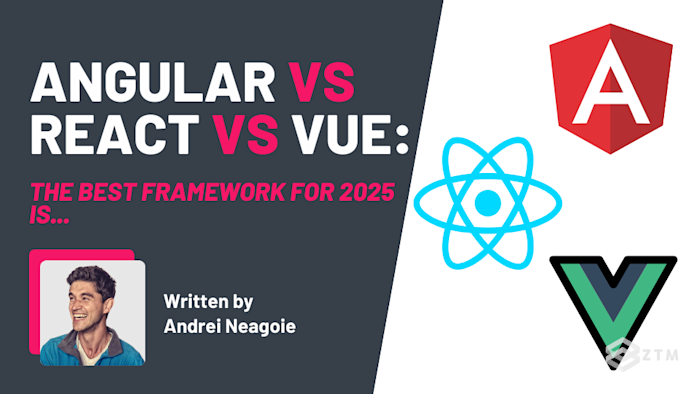
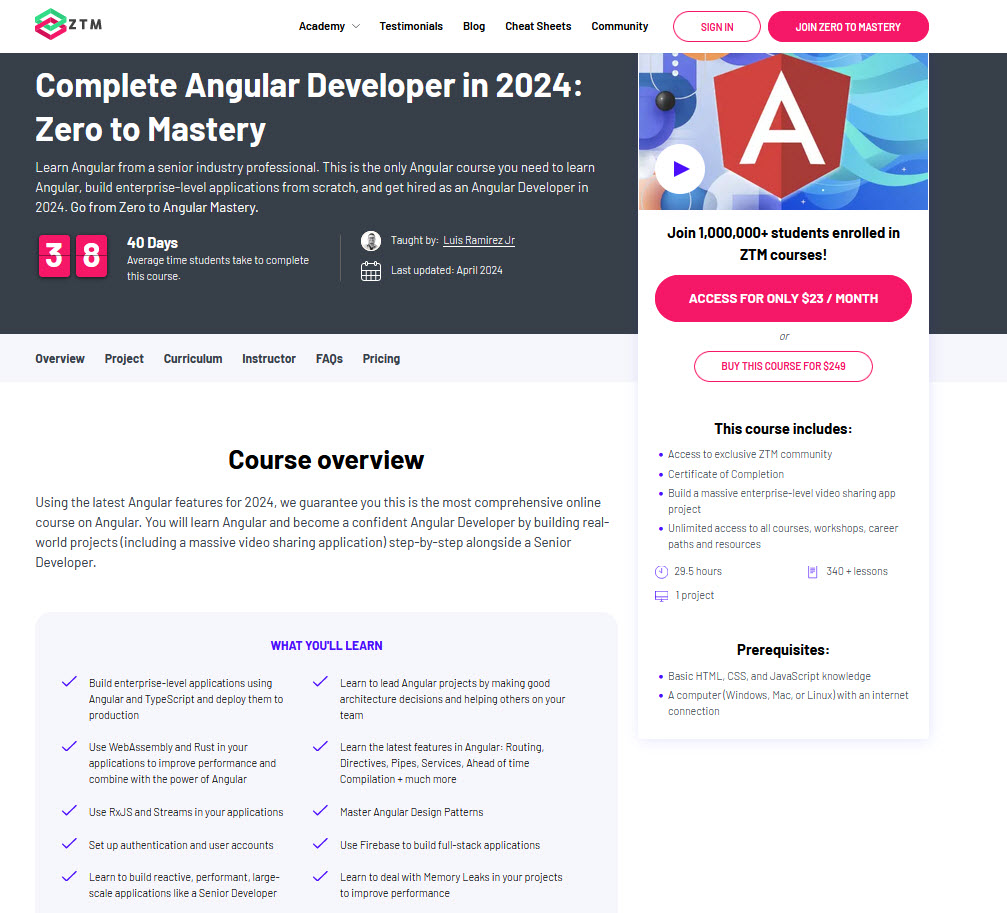
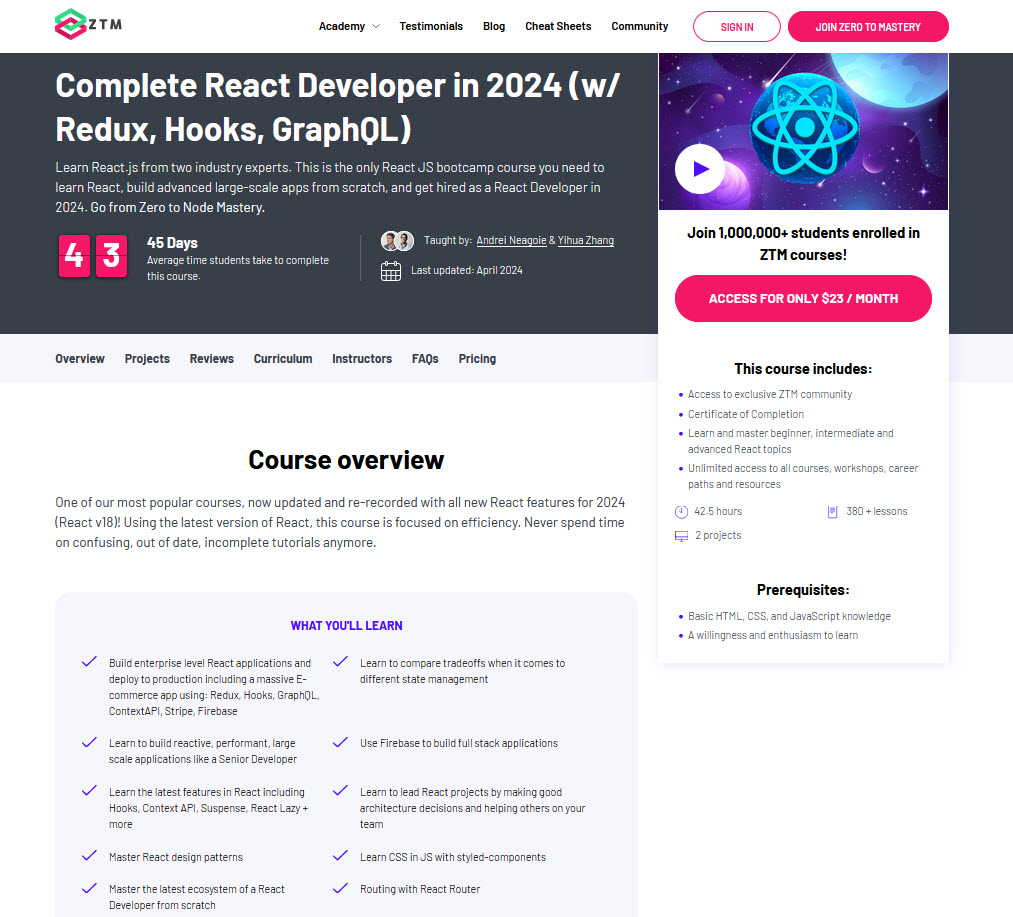
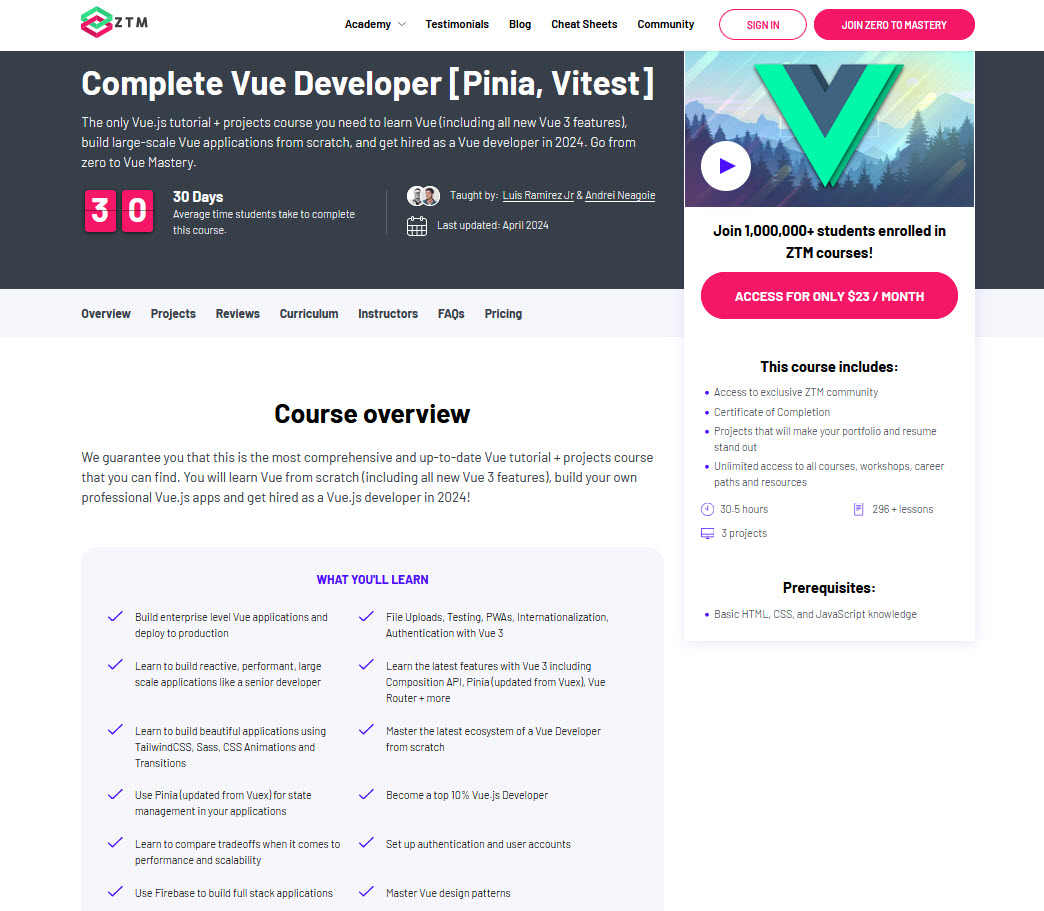
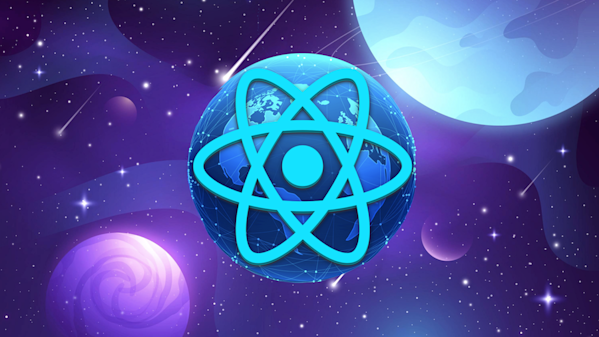

![Complete Vue Developer [Pinia, Vitest]: Zero to Mastery](https://images.ctfassets.net/aq13lwl6616q/1l0V8UVa67J2sBaci1BrWr/0cdceb5991f5ae94abe1e3d10b752725/Complete_Vue_Zero_to_Mastery.png?w=600&h=337&q=50&fm=png&bg=transparent)




